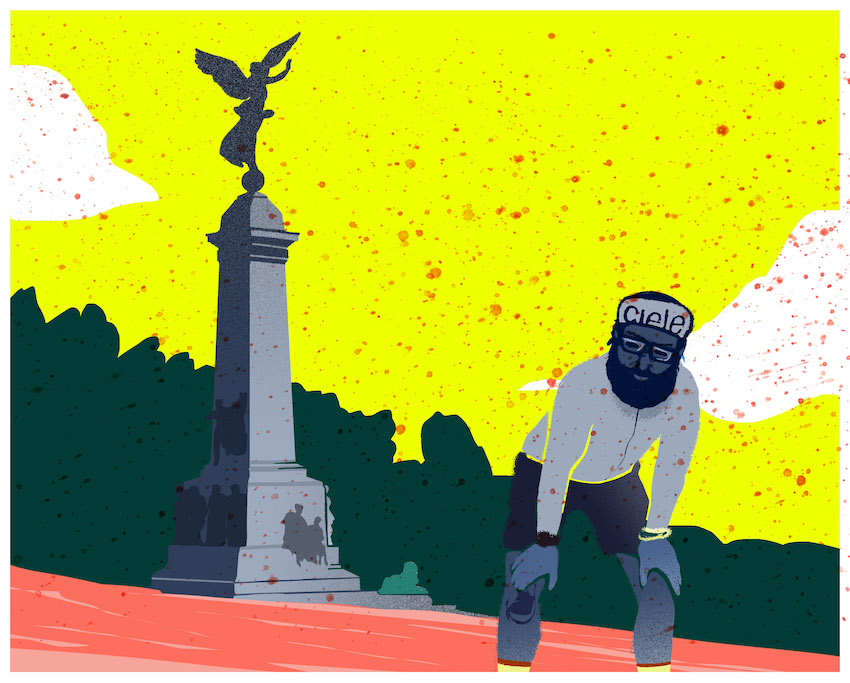Every race has its winner, but what about those who cross the finish line long after the leaders come home? Coming last is far from a failure… in fact, it has its very own sense of glory.

When he founded the modern Olympic movement, Pierre de Frédy (Baron de Coubertin) said: “The most important thing in the Olympic Games is not to win but to take part, just as the most important thing in life is not the triumph but the struggle. The essential thing is not to have conquered but to have fought well.” For many athletes who give so much to win on the biggest sporting stages in the world, the idea that participation trumps winning is hopelessly romantic and fundamentally untrue. However, for most of the rest of us, it underpins why we run.
But what about coming absolutely last? Can that ever be a badge of honour? Or is it always imbued with a sense of shame? To illustrate the latter attitude, there is a tale – likely apocryphal – of a race where the runner placed second from last turned to the person behind them and asked, with a sneer, how it felt to be dead last… only for that runner to answer “You’ll soon find out” as he stepped off the course.
If there is a sense of glory associated with coming last, it is linked to endurance and persistence. At the Ultra Trail du Mont Blanc, it has become a tradition for the last athlete crossing the line to be publicly honoured – the presentation of the winners’ trophies, in the square adjacent to the finish line, is timed to coincide with the final runner concluding their race.

The stark contrast between a runner who has been battling the distance and the elements for 46 or so hours and those who raced round in 20 hours (give or take) enthrals the crowd and ensures the hapless “last finisher” receives equally rapturous applause as the winners. The knowledgeable audience watching the awards ceremony more than understands the huge effort required to keep going for more than two whole days in pursuit of nothing more than a commemorative gilet and a great dinner party story.
To get into the mindset of someone who is happy to run without pushing – who is, in fact, happy with coming last – Paul Lott wrote an article for The Ciele Athletics Journal called The Slow Protest, about a runner by the name of Jordan. In the piece, Paul explains how Jordan came to embrace his slowness.
“‘In fact, I prefer to do things the opposite of what people think is cool because, well, that’s just me!’ [Jordan] exclaimed with a middle-finger salute.
“Running slow is Jordan’s thing, it’s something he owns. In a world where faster is almost always better, it stands as a true inspiration to be committed to purposefully running slowly. For Jordan, his ‘slow protest’ is an act of defiance that stems from a long history of being bullied at school and at home. ‘My mother used to tell me that I was an embarrassment and that I should be ashamed of who I am (a fat kid with ADHD),’ he recalled.
“‘When I run, I’m able to clear my mind. It’s a form of therapy that gives me the chance to prove to myself that everyone in my past who caused me pain was wrong about me,’ Jordan said.
“There seems to be a radical happiness and honesty lying in his very simple sense of freedom that stemmed from him accepting himself as someone who runs slowly.
“‘Splits are for gymnasts,’ he joked.
‘Being DFL (Dead Fucking Last) in a race is really cool. You spend the most time on your feet and you suffer the most. To me, that’s the best part because it means you truly earned it,’ he said wisely.”

In some cases, being last doesn’t really mean coming last in the true sense of the word. The last person across the line is actually created by the imposition of a cut-off. A great example of this is the Comrades race in South Africa. Travelling the 89km from Durban to Pietermaritzburg, or in reverse (the course direction swaps every year) there is a cut-off of 12 hours. At the finish line, a gun is fired at the exact moment the race is deemed to be over. Everyone after that is considered not to have finished. So the last runner is listed, but we can be sure that there were many more runners behind them who just weren’t fast enough. We can only imagine the relief of the person who sprints for the line, only to be the last one to cross before the trigger is pulled. And the heartbreak of the runner just a few strides behind who didn’t make it.
Indeed, the heartbreak of not being allowed to finish such a gruelling race is such that the person wielding the gun that separates the last finisher from the first of those not to make it often stands with their back to the runners stumbling hopelessly towards the finish.
This idea of creating a cut-off, which somehow artificially appoints the last athlete, has been immortalised at the Western States 100 race. This race has a strictly enforced cut-off of 30 hours. In 2019 runner, writer and photographer Tyler Tomassello captured the agony and ecstasy of the runners who came within minutes – in some cases, seconds – of the 30-hour mark. In his story for Like the Wind, Tyler described how crowds gathered to see the athlete who would come dead last.
“Runners flood on to the Placerville High School track, where bleachers filled with enthusiastic yet exhausted spectators and finishers scream at the top of their lungs. Closer and closer to the 30-hour mark runners come. Until finally, 29h59m00s clicks on to the clock hung above the finish line. Gasps and suspense fills the stadium, and suddenly all becomes quiet. ‘There is still one runner on the course,’ the announcer claims. With bated breath, the crowd waits. Until suddenly, out of the shadows, a man appears, blasting on to the track as if he had just begun the race. Spectators and runners, photographers and volunteers all erupt into thunderous words of encouragement. With one last kick and everything he has left, he crosses the finish line with 22 seconds to spare. Screams of joy flow around the mass of onlookers as if the last finisher, Lane Shimonishi, had won the race.”
In some cases, the person who comes dead last knows they will take that accolade before the race even starts. And the race organiser is complicit in their plan. In 2003 the former boxer Michael Watson, who was left with life-changing injuries after a fight with Chris Eubank 12 years previously, set off from the start line of the London Marathon in Greenwich, knowing that it would take him six days to finish. Almost a week after the finish line had been packed away, the organisers of the marathon erected a smaller finish line to welcome Watson and present him with his medal. The boxer was raising money for the Brain and Spine Foundation charity and by being dead last, he generated publicity and funds that were surely, at least in part, a reflection of admiration from the public for doing something that required unfathomable determination and endurance.
So as we approach the finish line of this piece, what conclusion can be drawn? Perhaps it is a simple one: while there is definitely glory in winning, and certainly glory in participating, the person who shows the grit, physical strength and sheer bloody-mindedness to stick it out, deserves – and almost always receives – a special kind of praise. So hats off to those who finish, no matter what. Those who come dead fucking last.
Illustration by Max Coubes
IN PARTNERSHIP WITH CIELE


